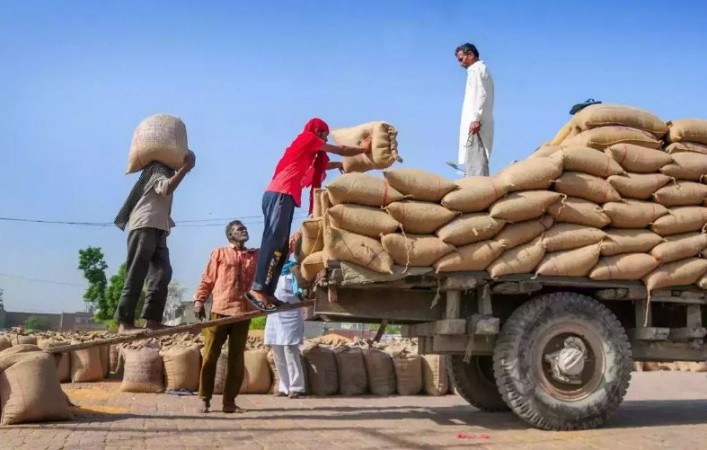
New Delhi: The Union Cabinet today, May 31, approved a scheme worth Rs.1 Lakh-Crore to increase foodgrain storage capacity by 700 lakh tonne in the cooperative sector, a report read.
As per the report, the Union Cabinet approved a plan worth Rs. 1 trillion to boost the cooperative sector's capacity for foodgrain storage by 700 million tonnes. The strategy attempts to integrate several initiatives from the ministries of agriculture and farmers' welfare, consumer affairs, food and public distribution, and food processing companies.
The country's grain storage capacity is at 1,450 lakh tonnes, said, Union Minister Anurag Singh Thakur.The storage space will increase to 2,150 lakh tonnes over the following five years.
The creation and empowerment of an interministerial committee (IMC) for the facilitation of the "World's Largest Grain Storage Plan in Cooperative Sector" was authorised today by the Union Cabinet, which is presided over by Prime Minister Shri Narendra Modi, as per govtr report.
The ministry of cooperation will launch a pilot project in at least 10 targeted districts spread across several states and Union Territories in order to ensure the timely and consistent implementation of the plan in a professional manner. The pilot project will offer insightful information about local needs that will be included into the plan's statewide execution.
The minister of cooperation will serve as the panel's chair, while other members will include the ministers of agriculture and farmer welfare, consumer affairs, food and public distribution, and food processing industries, as well as concerned secretaries.
In order to support the "World's Largest Grain Storage Plan in Cooperative Sector," the committee will adjust the policies and methods of implementation of the schemes of the individual ministries as necessary, within the approved budget and established objectives. The primary goal of the plan is to establish godowns at functional Primary Agricultural Credit Societies (PACS) for usage in agriculture and related industries.
The plan will make use of the funding sources offered under specific ministries' schemes that have been recognised. The mission for integrated development of horticulture (MIDH), the sub mission on agricultural mechanisation (SMAM), the agriculture infrastructure fund (AIF), the agricultural marketing infrastructure scheme (AMI), the pradhan mantri formalisation of micro food processing enterprises scheme (PMFME), and the pradhan mantri kisan sampada yojana (PMKSY) from the ministry of food processing industries are a few examples.
The allocation of food grains under the National Food Security Act and the purchase activities at minimum support prices conducted by the Ministry of Consumer Affairs, Food, and Public Distribution will also be included in the convergence.
The complex strategy creates godowns at the PACS level to alleviate the lack of agricultural storage facilities. It will allow PACS to carry out a number of tasks, including as acting as fair pricing stores, centres for bespoke hiring, and building up common processing units. Decentralised local storage facilities will cut down on food waste, improve food security, avoid crop distress sales, and save transportation costs.
The proposal's execution will take place in a predetermined amount of time. After receiving cabinet approval, a national level coordination committee will be established within a week, and 15 days later, implementation guidelines will be released. In addition, a portal for connecting PACS with the government will be launched within 45 days, and the plan's execution will start at the same time.
The primary agricultural credit societies (PACS) are intended to be transformed into prosperous and active business businesses by the ministry of cooperation. The plan's emphasis on agri-infrastructure, such as storage facilities and processing facilities at the PACS level, will increase farmer revenue, improve food security, and reduce wastage. This programme, which has over a million PACS and more than 13 crore farmers as members, aims to capitalise on the function of PACS in changing the agricultural and rural environment of the Indian economy.